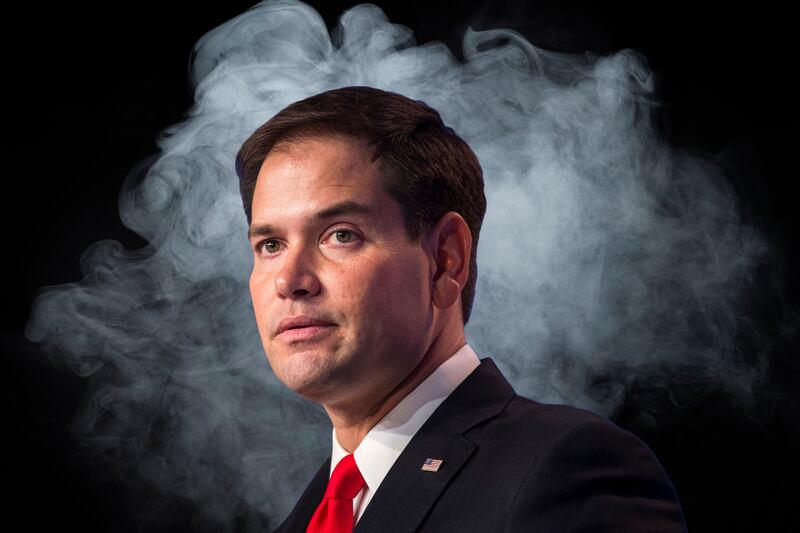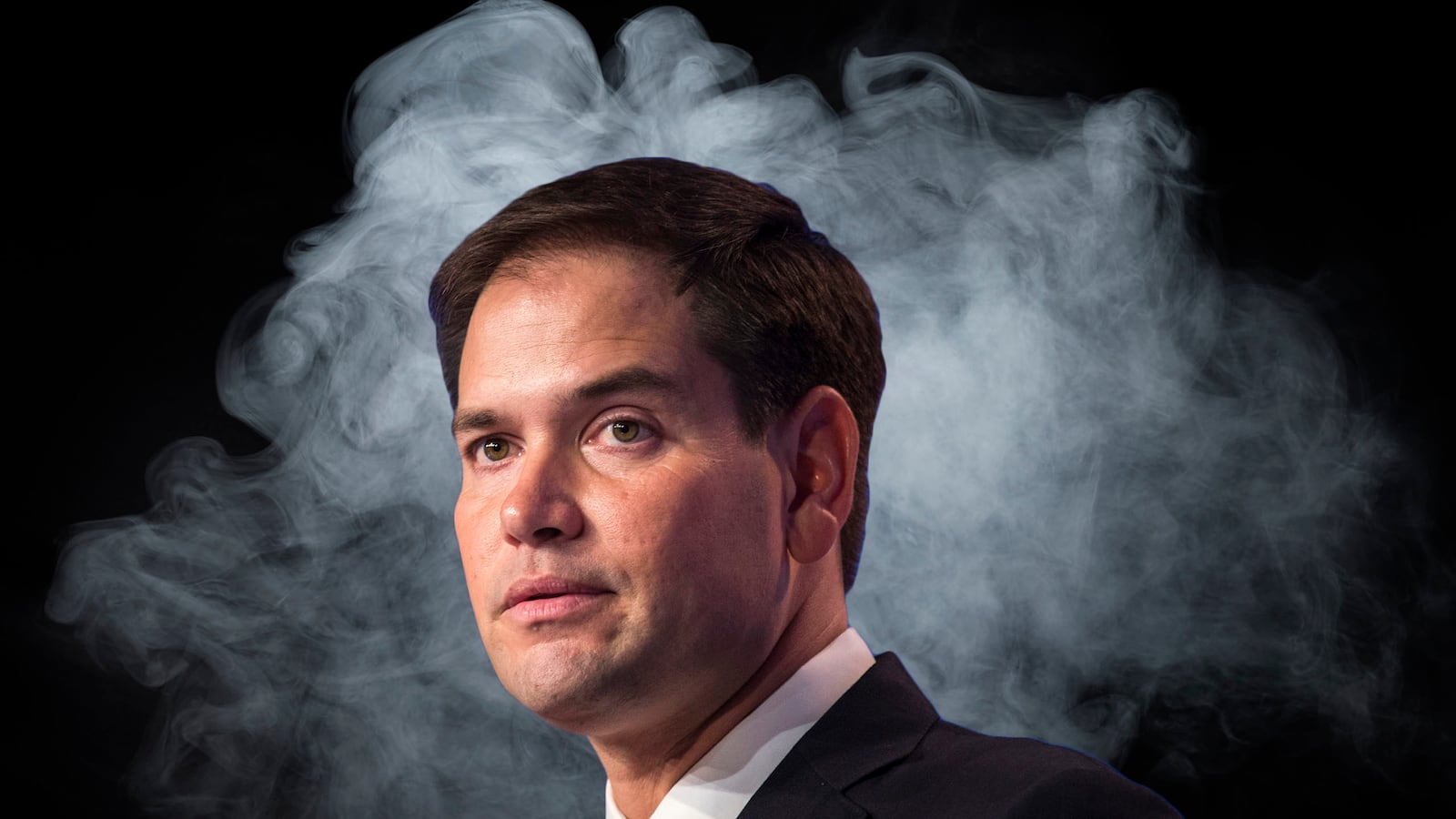Faced once again with a question about drug use, Senator Marco Rubio (R-Squaresville) scolded ABC News and Yahoo News for asking a “worthless question.” Evidently determined to put his inquisitors in their place, he gave them a worthless answer.

“I don't think there is a responsible way to recreationally use marijuana,” he intoned.
At a glance, that sounds like just the kind of die-hard prohibitionist reaction to pot that we’ve come to expect from Republicans. The GOP’s madness toward reefers is a prominent part of the political media landscape.
But inhale the fumes of Republican rhetoric more deeply, and a more mind-blowing reality comes into focus.
True, Sean Hannity recently convened a town-hall-like panel to discuss what his Fox News show called “STONED AMERICA.” Presented there, oblivious to the aftermarket mockery headed his way, was Bo Dietl, an ex-NYPD detective who carefully explained that “every one” of the “potheads” he knew in the ‘60s is now “brain-dead.”
One panelist, a Dr. Eric Braverman, took the courageous stand of comparing weed creep to the appeasement of Hitler. Or something.
Lest you think this is the death rattle of Republican credibility on drug issues, Hannity’s producers managed to slip in a few surprises. Vice co-founder Gavin McInnes was allowed to air the bumper-sticker version of the natural-right case for decriminalization. Reason editor-in-chief Matt Welch suggested that imprisoning tokers failed to meet the moral standards that defined conservative politics.
What’s more, conservative talk radio host Guy Benson cautioned against Dietl’s argument by anecdote. After all, for every “brain-dead” old hippie stumbling around Northern California, there’s a platoon of college grads who have traded in their bongs (or not) for well-paid jobs in technology and finance.
Tellingly, Rubio didn’t fall back on any anecdotes about pot. Even more tellingly, however, he quickly whipped out an anecdote of a rather different kind—one he’s used before.
"Someone came up to me and said, ‘You know, I enjoyed your book, but I want you to know, my son came up to me and said he doesn't have to get good grades in high school, because look at Marco Rubio, he didn't do well in high school and look how successful he's been.’”
That embarrassing moment, Rubio continued, left him more than hesitant to give even the appearance of condoning drug use.
Of course, it’s ridiculous to hold politicians morally responsible for admitting they didn’t ace every exam and set the curve in every class. If Rubio—and ambitious officeholders like him—weren’t so paranoid about polls and PR, they’d laugh in the face of parents who can’t come up with so much as a pearl of wisdom when their kids try to skate by on contorted logic that relies on national figures’ past academic performance.
Similarly, it’s absurd to imagine that parents are powerless to impart their morals if politicians advance anything short of a crackdown agenda on weed.
In fact, that’s why Rubio didn’t go so far as to say he wanted harsher laws. All he would commit to was enforcing federal law. And all he’d say about his “bottom line” on pot prohibition was that legalizing “yet another mind-altering substance” isn’t “good for the country.”
Tell that to the pharmaceutical industry.
Yes, Rubio’s position on pot has all the integrity and staying power of president Obama’s long-“evolving” position on gay marriage. It has all the hallmarks of a fighting retreat—the admission that people have “different views,” the refusal to stand by a straight answer, the weak analogies and the appeal to the children.
The principled position on banning pot is simple enough. It’s not that more people would get high in a different way. It’s that, if marijuana were legalized, too many people would get too high.
But that’s not what. Rubio said, and he’s a man who chooses his words carefully.
The political problem is straightforward. In the short term, especially, it’s possible that substantially more people would get substantially more intoxicated if marijuana legalization were allowed to proceed.
On the other hand, it’s certain that many Americans would continue to sharply disagree about whether that increased number—and that increased high—should be viewed as excessive.
And it’s clear that growing numbers of influential Republicans—whether libertarian or conservative—don’t even want to criminally punish people who get too high.
In other words, Rubio doesn’t like pot because he doesn’t want to talk about it. From a political standpoint, there’s no responsible way for him to talk about it.
After all, his base includes lots of people who just won’t budge on their anti-weed attitudes. It makes as much sense for Rubio to get into the weeds on legalization as it makes sense for Rand Paul to muck around with Cuba policy. In a primary season, you play to your strengths.
And that’s a big part of why Republican opposition to legal weed will continue to carefully crumble. If you’re on the right and drug policy is one of your strong suits, chances are good that you’re not in the die-hard prohibition camp. Even many Republicans who would prefer a country without lots of potheads concede that they cannot suddenly become enemies of federalism—and admit that you can only throw so many recreational marijuana smokers in jail before you make society worse instead of better.
Pot is a stumbling block for establishment Republicans. By steering clear, they’re handing the momentum to their party’s smartest advocates for substantial reform.




